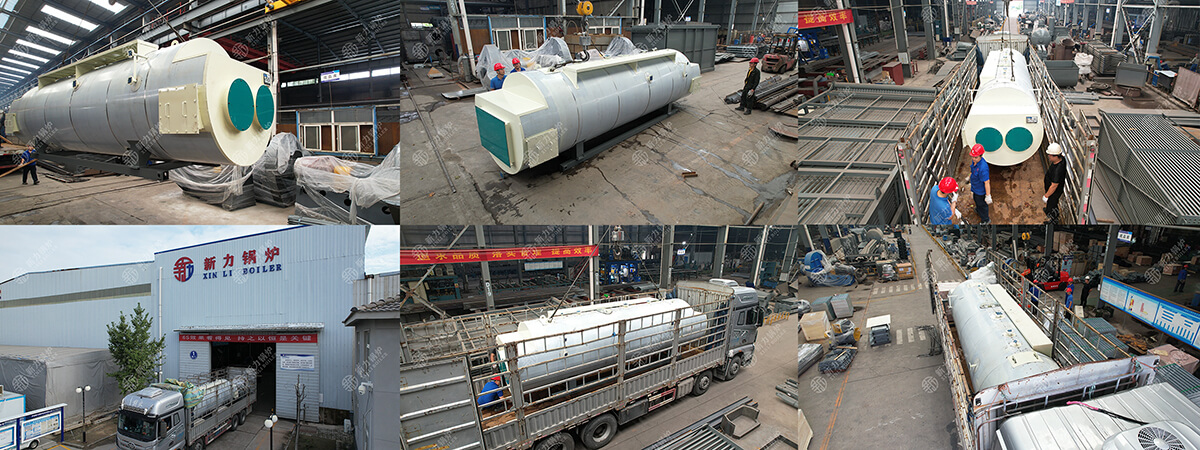Guide: A large textile printing and dyeing joint venture in the Bangladesh ordered a 2 tons of exhausted gas recovery boiler from Xinli Boiler.
The textile industry in the Bangladesh holds a pivotal position in its economic system as an important base for global textile manufacturing. The textile industry is the main source of export earnings for the country. However,Bangladesh's textile industry is facing dual economic and environmental pressures due to high energy consumption with the increasingly strict international environmental standards. It requires a large amount of energy in fiber processing, dyeing and finishing processes, especially in terms of steam and heat energy demand. The textile industry in Bangladesh is highly dependent on natural gas, which accounts for over 50% of its energy structure. However, in recent years, the shortage of natural gas supply and significant price fluctuations have dealt a heavy blow to Bangladesh's textile industry that result in an increase of about 40% in production costs for textile enterprises. In addition, traditional energy supply methods often come with serious environmental pollution problems. The wastewater and exhaust gases generated by the textile industry have caused great damage to the local environment. In such a severe situation, a large textile printing and dyeing joint venture in the Bangladesh deeply felt the pressure brought by the energy crisis during its development process. The high energy costs have severely compressed the profit margins of enterprises, and environmental issues have also raised many questions about them in the international market. This company learned about the enormous potential of waste heat steam boilers in energy conservation and consumption reduction through participating in international textile industry exhibitions, consulting professional technical literature, and exchanging with industry experts. And Xinli Boiler attracted the company's attention with its outstanding reputation and successful cases in the field of waste heat utilization among numerous boiler suppliers. The project leader expressed a strong interest in the waste heat steam boiler and hoped that Xinli Boiler could provide an energy solution suitable for the production needs of the enterprise after contacting our sales manager .
Xinli Boiler's design team customized a Q12/390-1.6-1.05 series waste heat recovery boiler specifically for solving energy consumption problems in the textile industry after understanding the specific needs of the customer. This boiler adopts advanced combustion technology, which can fully burn the waste heat in the industrial production process and improve energy utilization efficiency. The fuel supply system can accurately control the amount of fuel supplied that can ensure the stability and efficiency of the combustion process. The auxiliary combustion air supply device provides sufficient air for the combustion equipment to ensure the full progress of the combustion process. The waste gas recovery system can collect the waste gas from industrial production processes through efficient waste gas pipelines and chimneys, and transfer the waste heat in the waste gas to the boiler for utilization. The exhaust gas treatment equipment purifies the exhaust gas to meet environmental emission standards. The customer can efficiently recover the high-temperature flue gas generated during the gas turbine power generation process by installing this type of waste heat boiler faced with the increasingly high energy costs and the demand for green production in the international market. Thus, it can be converted into stable steam required for production to achieve significant energy savings, carbon emissions reduction, and operational cost reduction and provide a replicable successful model for the sustainable development of the textile industry in Bangladesh and even globally. With the acceleration of global energy transition and the gradual implementation of policies such as carbon tariffs, utilizing efficient energy-saving methods such as waste heat steam boilers for refined energy management will become an inevitable choice for Bangladesh's textile industry to maintain international competitiveness and achieve sustainable development. The picture shows the delivery site of the boiler:
More information on LinkedIn:
https://www.linkedin.com/posts/xinli-boiler-917522197_steamboiler-wasteheatrecoveryboiler-egbboiler-activity-7384139519576596480-vzCh?utm_source=share&utm_medium=member_desktop&rcm=ACoAAC4sYKMBTqqpjrBcO0PdMS8SVHCOdnfEBw8
Related video on YouTube:
https://www.youtube.com/watch?v=MVHYYwZN7_g


 Email: [email protected]
Email: [email protected] 